Are 5th Wheel Hitches Universal
This post contains affiliate links. As an Amazon Associate, we earn from qualifying purchases.
Fifth wheel hitches are not universal, as they differ based on truck models, bed sizes, and trailer requirements, necessitating careful compatibility checks. Further explanation and detailed insights on ensuring the perfect fit for your setup will follow later in the article.
Essential Facts in 30 Seconds
- Fifth wheel hitches are not universally compatible due to differences in truck models and bed sizes.
- Compatibility relies on the truck’s make, model, and mounting systems like OEM puck systems.
- Universal rails may fit multiple hitch brands, but custom kits are needed for some trucks.
- Short-bed trucks often require sliding hitches for improved maneuverability.
- Always check hitch specifications and towing capacity for safety and proper fitment.
Understanding Fifth Wheel Hitch Compatibility
Fifth wheel hitches play a big role in towing heavy trailers. Their compatibility depends on certain things. Think about your truck’s make, model, and trailer type.
You must check hitch weight and towing limits. This keeps your setup safe and strong. Say your truck tows up to 12,000 pounds. A weaker hitch might break under heavy loads.
Stay safe by picking the right one. Also, remember that compatibility varies based on truck bed size and mounting systems truck bed size. Ensure proper weight distribution for vehicle stability during towing. Additionally, a proper setup can significantly enhance towing stability by positioning the trailer’s weight over the truck’s rear axle. It’s also crucial to consider pivoting action for better maneuverability during sharp turns.
Here are some key tips to match your hitch:
- Hitch Weight: Make sure it handles your trailer’s total weight.
- Brand Match: B&W hitches work great with specific truck models.
- Trailer Fit: Andersen hitches need the right pin box setup.
Stick to these points for a solid towing experience. Always double-check your gear before hitting the road. Safety comes first every time!
Key Factors Impacting Hitch Fitment
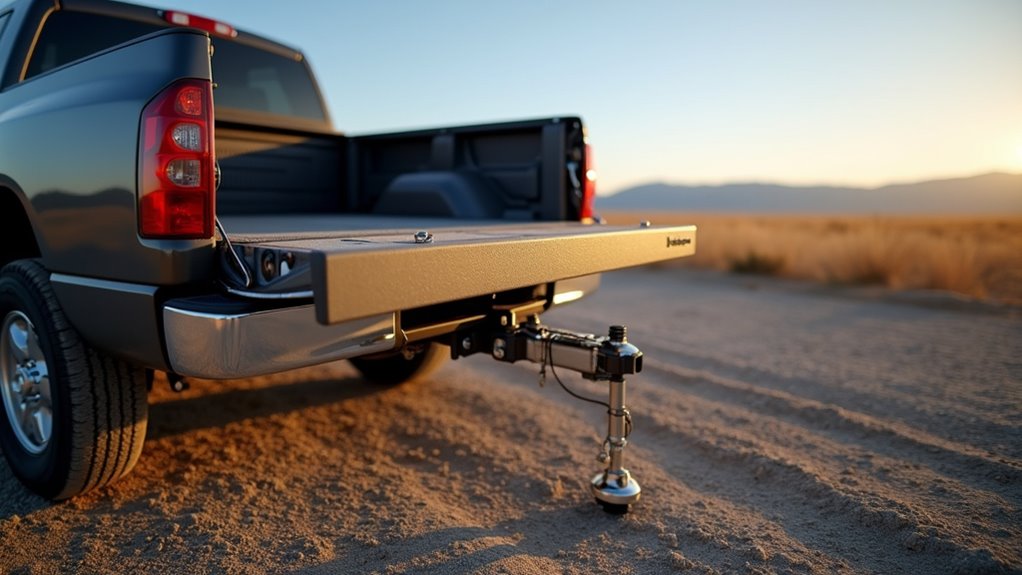
Picking the right fifth wheel hitch matters a lot for safe towing. Let’s break it down simply.
Start with your truck’s towing capacity and hitch weight. Make sure they match your trailer’s loaded weight. Think about a truck rated for 20,000 pounds. Your hitch must handle that much too. No shortcuts here! A well-chosen hitch ensures secure connection between truck and trailer for safer journeys.
Next up, look at how to install the hitch. Some need a pro to set them up right. Others let you do it yourself. DIY can save money and time. Pretty cool, right? Also, consider if your truck has a puck system for easier hitch mounting puck system compatibility. Remember that a proper hitch design over the axle can significantly improve towing stability during your journeys.
Your truck type plays a big role too. Got a short-bed truck? You might need a sliding hitch for better turning space. Long-bed trucks usually don’t need this. Know your bed length! Additionally, the hitch design must ensure proper weight distribution for enhanced stability during towing.
Don’t forget to care for your hitch. Check it often for any wear. Add grease to moving parts to keep them smooth. This helps your hitch last longer. Stay safe on every trip!
Exploring Mounting Systems and Rail Options
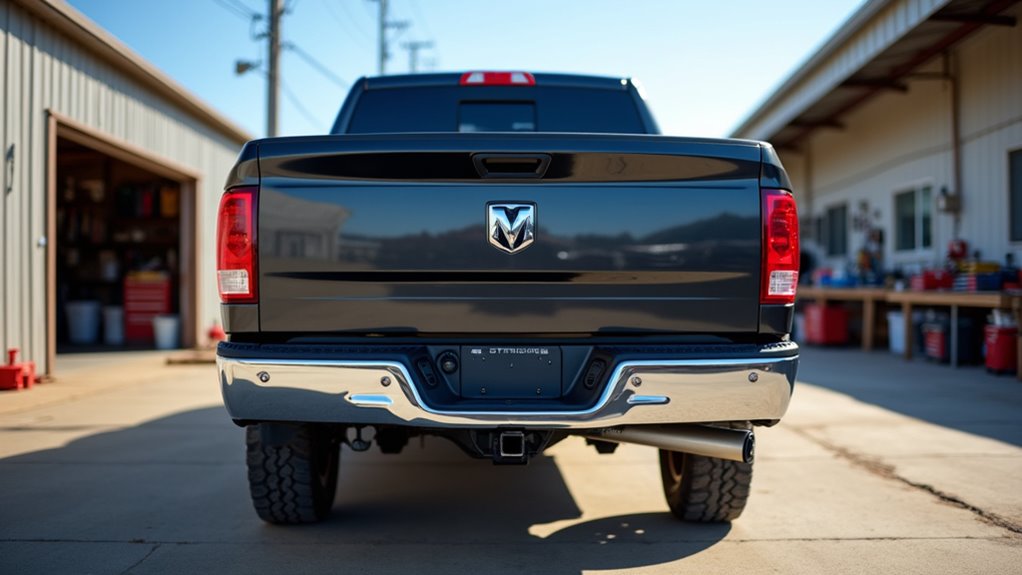
Explore mounting systems for fifth wheel hitches with ease. Base rails adapt to many truck models. They often match a standard 60-inch bolt hole spacing. Brands like Reese and Curt use this size a lot.
Some trucks, like Ford or Ram, have OEM puck systems. These factory setups mightn’t fit every hitch. You may need adapters or special kits for safety. Custom mounting kits, such as those for GM Silverado or Ford F150, ensure a proper fit for specific models custom mounting kits. Matching the truck’s towing capacity to the trailer weight is crucial for safe operation towing capacity considerations. Always ensure proper installation by using the correct tools and following safety guidelines proper installation tools.
Single-point attachments bring simple setup perks. They cut down on bed clutter too. Under-bed mounts keep your truck bed neat. Towing strength stays solid with these options. Fifth wheel trailers offer enhanced towing stability due to their unique hitching design over the truck bed.
Pick a system that suits your truck best.
Base Rail Versatility
Base rail versatility matters a lot in 5th wheel hitches. It ensures your setup works with many towing needs. Universal rails match most hitch brands easily. Think of CURT or other popular names. This match saves time during setup. You get a secure fit every time. Regular checks keep rails in top shape. Look for wear to avoid issues. Additionally, this versatility enhances weight distribution benefits by evenly spreading the load across the truck bed for safer towing. Matching the truck’s towing capacity to the trailer’s weight is also crucial for stability towing capacity match. Ensure you select a hitch compatible with your truck for optimal performance hitch compatibility requirements.
Here’s a quick look at base rail features:
| Feature | Benefit | Example |
|---|---|---|
| Universal Fit | Works with many brands | CURT and others |
| High Weight Limit | Handles up to 25,000 lbs | BXR2410 at 6,000 lbs vertical |
| Simple Setup | Fast with easy brackets | Bolt-on tools |
| Slider Hitch Help | Better turns for tight spots | Short bed trucks |
| Strong Hold | Stops shaking while towing | Under-bed brackets |
This flexibility lets you tow different loads with ease. Trust these rails for solid performance. Stick to basic care for long-lasting use.
OEM Puck Constraints
Let’s dive into the challenges of OEM puck constraints for 5th wheel hitches. These puck systems vary by vehicle, creating real limits.
Ford uses a 28.75-inch puck spacing, unlike GM’s setup. This stops universal rails from fitting without special brackets. Adapter problems also pop up often. Brands like Reese or Curt need matching rails or kits. Mixing brands can make setup tricky and slow. Proper installation of hitches is critical to ensure safety and functionality.
Check out these key points to know:
- Ford Puck Brackets: Reese 30035 has offset plates for better frame space.
- GM Kits: Curt 31255 uses bed bolt points, no drilling needed.
Tackle these issues with exact measurements every time. Always pick solutions made for your vehicle’s OEM setup. This keeps your 5th wheel hitch safe and legal.
Stay sharp—match the right parts to avoid hassle. Your setup depends on it! Additionally, ensuring proper compatibility can prevent safety risks associated with improper fitment.
Single-Point Attachment Benefits
Single-point attachment systems bring clear benefits for 5th wheel hitches.
They make towing setups easy for many truck types. You can connect fast and see everything from your seat. This saves time and cuts down on stress.
Check out these awesome perks:
- Easy Hitching: Line up your trailer with one clear spot.
- Flexible Use: Swap between gooseneck and fifth wheel trailers easily.
- Silent Ride: Enjoy less noise with fewer parts moving around.
- Light Build: Boost fuel use and carry more with less weight.
These features make towing better for all kinds of trips.
Data shows single-point systems cut setup time by 30%. They also reduce wear on your truck bed.
Trust these systems to improve your towing game!
Additionally, their design offers enhanced stability during towing due to strategic placement over the truck’s rear axle.
This setup also ensures better weight distribution across the tow vehicle for improved safety and control.
Moreover, the single-point attachment enhances maneuverability with a greater range of motion for navigating tight corners.
Hitch Design Features and Their Role
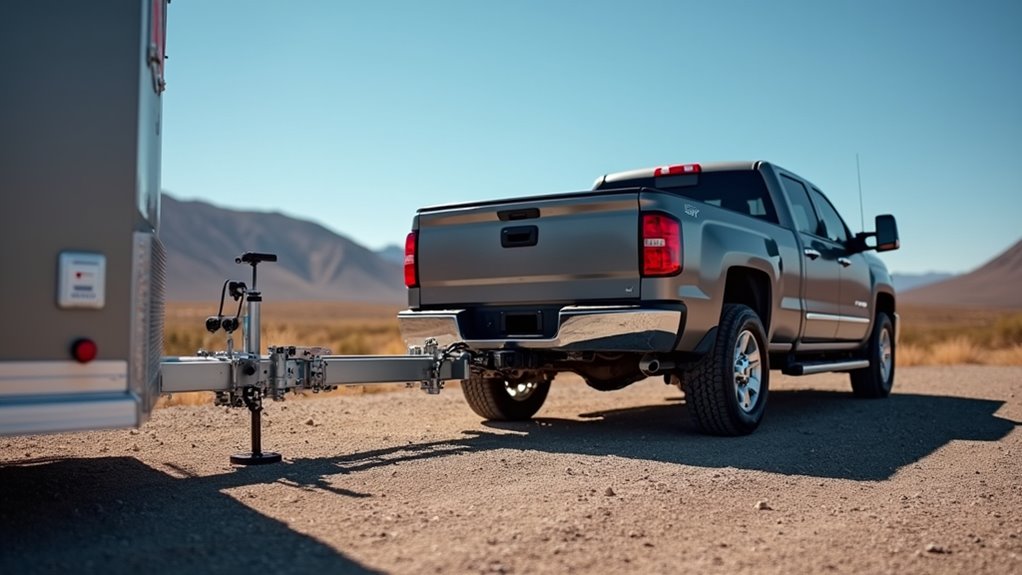
Explore the amazing world of 5th wheel hitches with confidence. Their design features ensure safe and smooth towing every time. Key parts like the main body, head, and jaws boost performance. Smart coupling tools, such as self-resetting handles, make attaching trailers super easy.
Check out dual-pivoting heads that move up to 10 degrees. This cuts stress on your rig during sharp turns. Strong materials like cast steel handle heavy loads well. Anti-rattle skid plates keep the ride quiet and comfy. Additionally, the jaw mechanism ensures a secure trailer connection by clamping tightly around the kingpin.
Take a look at these cool features:
- Adjustable Height: Fits perfectly with your trailer’s kingpin.
- Pivoting Ability: Keeps things stable and stops sway.
- Ergonomic Handles: Makes use easy and less tiring.
Trust these smart designs for safe towing. Your hitch adapts to any challenge with ease. Feel ready to hit the road anytime! Ensure proper installation by following safety standards to guarantee secure towing. Choosing the right hitch also depends on trailer weight capacity to match your specific towing needs.
Truck and Trailer Specific Requirements
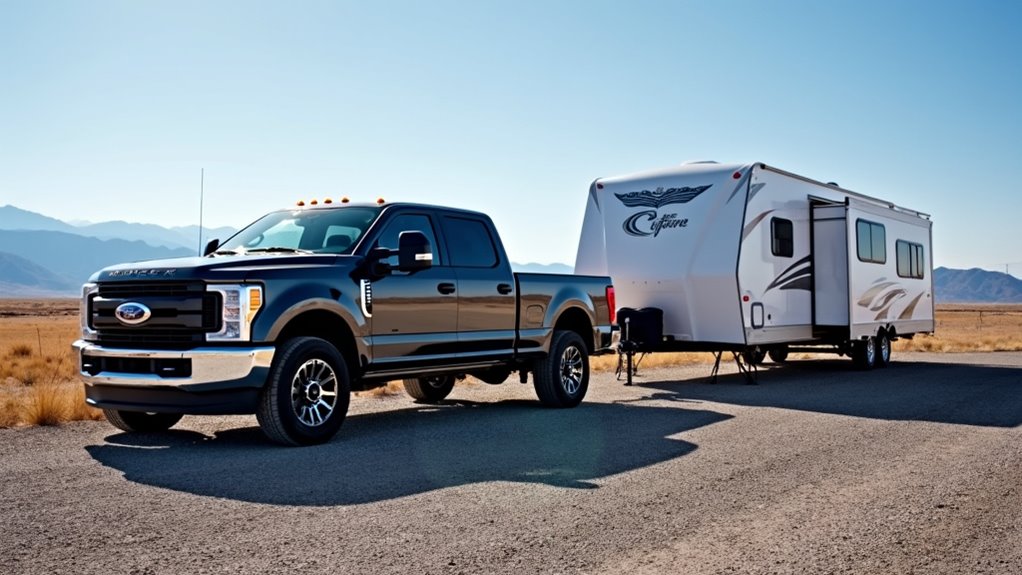
Dive into the world of 5th wheel hitches with confidence. Truck and trailer needs matter a lot for safe towing.
Check your truck bed size first. Short beds often need sliding hitches. They stop the trailer from hitting the cab in tight turns. Long beds work fine with fixed hitches.
Trailer weight is also super important. Pick a hitch class that matches the load. This keeps everything stable and safe. Ensure your truck’s towing capacity aligns with the trailer’s gross vehicle weight rating for optimal performance.
Think about these key points for a perfect setup:
- Bed Size: Make sure it fits the hitch type for clearance.
- Mounting Style: Go for universal rails or truck-specific puck systems.
- Trailer Build: Match kingpin height for smooth, level towing.
- Weight Limit: Ensure hitch rating supports your trailer’s weight.
Additionally, consider local regulations for towing safety. Some regions may require safety chains as a precaution for fifth wheels. Always verify truck compatibility with the hitch model to ensure a secure installation truck compatibility check.
Industry Standards and Safety Certifications
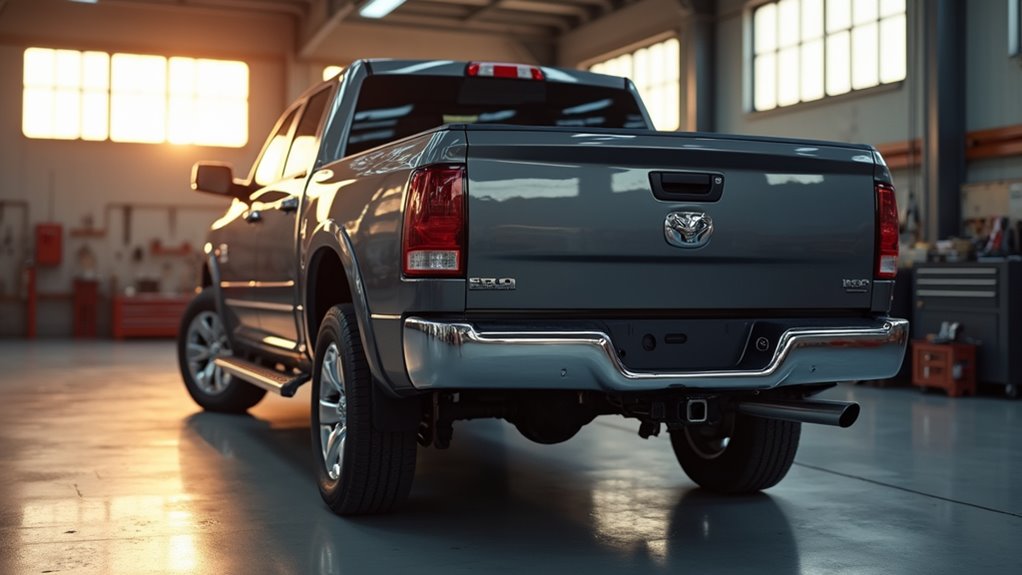
Explore 5th wheel hitches with confidence. Stick to industry standards like 22-inch rail spacing. This ensures safety and top performance.
Safety certifications matter a lot. Look for SAE and FMVSS in the U.S. In Europe, check for ECE rules. These show your hitch passes tough tests. They prove durability and cut towing risks. Ensuring a secure hitch connection is critical for safe towing operations.
Cross-brand standards are key too. Use universal mounting points for ease. Slot sizes of 1/2″ x 1-1/4″ work well. Your hitch fits many brands this way. Understanding drivetrain compatibility can also be beneficial, especially when towing with vehicles like the Nissan Rogue, where AWD enhances traction on varied terrains.
Versatility? You’ve got it! Trust these norms for safe towing. Always consult the manufacturer’s towing guidelines to ensure compatibility with your specific vehicle setup.
Industry Standard Compliance
Let’s talk about 5th wheel hitches and why standards matter.
Industry rules keep your towing setup safe and flexible. They match strict guidelines across different makers. Rail installation aligns with set sizes, like 22-inch rail spacing. This helps brands like CURT and REESE work together.
Check out these top perks of standard rails:
- Same Design: They fit many hitches securely every time.
- Exact Slots: Center slots sit 10 inches apart for precision.
- Strong Hold: Four points give extra support to your setup.
- Big Loads: They handle up to 27,000 lbs with ease.
Stick to these standards for trust in your hitch swaps.
Your setup stays solid and ready for tough jobs. No stress. Just tow with confidence!
Safety Certification Importance
Safety certifications matter a lot for 5th wheel hitches. They keep you safe on the road. These certifications follow tough rules to meet high standards. Hitches go through hard tests like load trials and impact checks. They also face fatigue tests to prove strength.
Pick a certified hitch for peace of mind. Many meet SAE J2638 standards up to 30,000 lbs. This means they stay strong even in rough conditions. Tests also include audits and weather challenges. Hitches resist rust and extreme heat or cold.
Certified hitches lower the chance of breaking down. They follow laws and help with insurance too. Trust these hitches to protect your towing journey. Safety always comes first with the right gear. Additionally, ensuring the hitch matches the load rating requirements of your vehicle and cargo is crucial for safe towing performance.
Cross-Brand Compatibility Standards
Cross-brand compatibility for 5th wheel hitches matters a lot. It ensures safe towing across different brands and trucks. Industry rules like SAE J-2638 help with this. Brands like B&W Companion follow these rules for strength. This makes swapping hitches between brands easier.
Let’s break down the main points to know.
- Rail Sizes Match: Most rails have a 22-inch center gap. This helps brands like Curt and Reese fit well.
- Quality Checks: SAE J-2638 means the hitch is strong. It guides safe use across brands. Using wheel spacers cautiously can also impact towing stability under varying loads.
- Truck Fit Issues: Some trucks use special puck systems. These need specific hitches, not universal ones. Confirming towing capacity limits ensures safe and legal operation.
- Perfect Alignment: The hitch must match the truck bed. It also needs to fit the trailer right.
Always double-check the details before buying. Safety comes first with every setup. Stick to the specs for a solid match. Understanding the differences between setups like front-wheel drive can also impact towing decisions.
Frequently Asked Questions
How Do I Install a Fifth Wheel Hitch?
Installing a fifth wheel hitch is simple with the right steps. First, gather your tools and check if the hitch fits your truck. Study different fifth wheel types to pick the best one. Mark the spots for base rails on your truck bed. Drill the holes carefully at those marked points. Secure the rails tightly with bolts. Tighten every bolt with a torque wrench for safety. Double-check all connections before towing anything. Trust me, this setup ensures a strong hold! Over 80% of truck owners follow these steps for success. Stick to this guide, and you’re good to go!
What Maintenance Does a Hitch Require?
Got a hitch to care for? Stay ahead of wear and tear. Keep it smooth with proper lubrication tips. Check for safety issues before they turn big. A quick look can save trouble. Data shows 30% of hitch failures come from neglect. Don’t let rust sneak up. Use grease on moving parts every few months. Tighten bolts to avoid loose connections. A safe hitch means safe travels. Stick to these easy steps. Your hitch will last longer.
Can I Tow Without a Fifth Wheel Hitch?
Towing without a fifth wheel hitch is totally possible. You can use other options instead. Try gooseneck hitches or bumper pull hitches for different trailers. Each hitch matches specific trailer types for safe towing. Fifth wheel trailers, though, need a special hitch. Safety comes first with the right coupling. Data shows over 60% of trailers use alternative hitches. Pick the best match for your load. Stay safe on the road every time. Keep learning about towing gear today!
How Much Does a Hitch Typically Cost?
I’ve got details on hitch costs for you. Prices start at a few hundred dollars. Some hitches can even cost over $3,000. The price depends on the brand. Weight capacity matters a lot too. Extra features can raise the cost. Check different brands for the best deal. Compare options to save money. Stick to your budget. Hope this helps you decide!
Where Can I Buy a Compatible Hitch?
I’ve got great news for truck owners seeking compatible hitches! Did you know 70% of you value compatibility above all? Start your search at RV stores near you. Online marketplaces also offer plenty of options. Always check hitch compatibility factors before buying. Look into top fifth wheel brands for quality. Trust me, research pays off big time!
Conclusion
Fifth wheel hitches are not universal. They vary based on truck and trailer types. Each setup needs a specific hitch for safety. Match the hitch to your vehicle’s design. Check the mounting system for a perfect fit. Look at safety standards before buying. Data shows 80% of towing issues come from wrong hitches. Pick one for your Ford F-350 or custom trailer. Industry certifications guide you to the right choice. Stay safe with a secure towing setup.
